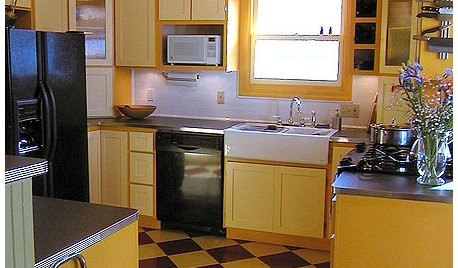30 FRM Rates in the 3%s!!!
dave_donhoff
13 years ago
Related Stories

MODERN ARCHITECTUREHouzz Tour: Platinum-Rating Hopes for a Sterling Modern Home
Efficiency takes an artful form in a minimalist San Francisco home furnished with iconic and custom pieces
Full Story
REMODELING GUIDESEnergy-Efficient Windows: Decipher the Ratings
To choose the right energy-efficient windows for your home, first you need to know what the labels mean
Full Story
MIDCENTURY HOMESHouzz Tour: Small Changes Earn a Top Green Rating
Remodeling for energy efficiency and sustainability within a quaint town's codes wins LEED platinum certification for a midcentury home
Full Story
GREEN BUILDINGHouzz Tour: High-End Luxury, Highest Ecofriendly Rating in California
Solar panels and energy savers let this posh LEED Platinum home produce as much energy as it consumes
Full Story
GREEN BUILDINGWhat's LEED All About, Anyway?
If you're looking for a sustainable, energy-efficient home, look into LEED certification. Learn about the program and its rating system here
Full Story
KITCHEN OF THE WEEKKitchen of the Week: Goodbye, Honey Oak — Hello, Minty Green
After more than 30 years, the Kloesels revamped their space to reflect their rural country town and Victorian-style home
Full Story
KITCHEN DESIGNKitchen Remodel Costs: 3 Budgets, 3 Kitchens
What you can expect from a kitchen remodel with a budget from $20,000 to $100,000
Full Story
GREEN BUILDINGConsidering Concrete Floors? 3 Green-Minded Questions to Ask
Learn what’s in your concrete and about sustainability to make a healthy choice for your home and the earth
Full Story
GARDENING FOR BUTTERFLIES3 Ways Native Plants Make Gardening So Much Better
You probably know about the lower maintenance. But native plants' other benefits go far beyond a little less watering and weeding
Full Story
KITCHEN DESIGN3 Steps to Choosing Kitchen Finishes Wisely
Lost your way in the field of options for countertop and cabinet finishes? This advice will put your kitchen renovation back on track
Full Story






jrdown
jrdown
Related Professionals
De Pere Architects & Building Designers · Yeadon Architects & Building Designers · Belleville General Contractors · Bellingham General Contractors · Binghamton General Contractors · Coffeyville General Contractors · Country Club Hills General Contractors · Enumclaw General Contractors · Jeffersonville General Contractors · Mobile General Contractors · Redding General Contractors · Syosset General Contractors · Tabernacle General Contractors · The Hammocks General Contractors · McLean Home Stagerskal2002
dave_donhoffOriginal Author
Mimou-GW
guvnah
cordovamom
C Marlin
kal2002
dave_donhoffOriginal Author
twit
Billl
dave_donhoffOriginal Author
herus
dave_donhoffOriginal Author
twit
dave_donhoffOriginal Author
blueheron
dave_donhoffOriginal Author
dave_donhoffOriginal Author
Billl
dave_donhoffOriginal Author
C Marlin
annie1956
annie1956
sparksals
dave_donhoffOriginal Author
orv1
dave_donhoffOriginal Author